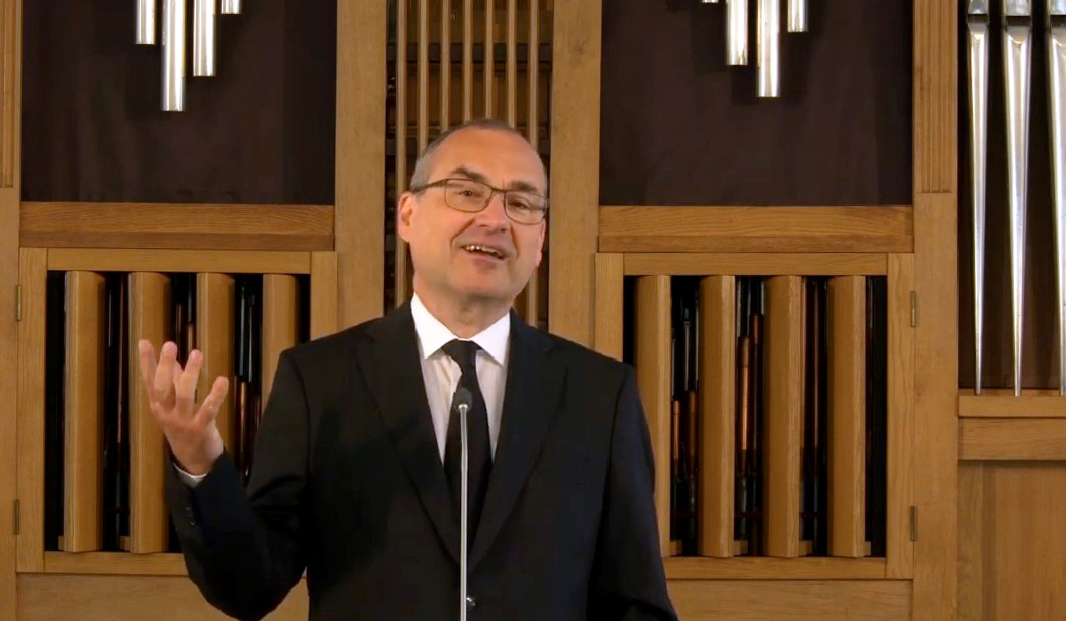
This is nothing new: people have wishes as long as they live. In His time, Jesus asked a blind man sitting by the side of the road what He could do for him. The man responded promptly. Here is an excerpt from a sermon by the Chief Apostle.
“What do you want Me to do for you? He said, ‘Lord, that I may receive my sight’” (Luke 18: 41). It was a simple and short conversation, not a long debate or discussion. And yet there is plenty of food for thought, because Chief Apostle Jean-Luc Schneider did not preach about a medical miracle on 14 February 2021 in Strasbourg (France). When it speaks about “sight” here, what is meant are eyes of faith.
Interesting is, the Chief Apostle said, that the blind beggar cried out to Jesus calling Him Son of David. This showed that the man had recognised Jesus as the Messiah. The people who were with Jesus considered it inappropriate for a beggar to speak to such an important person and warned him to be quiet. But the beggar cried out all the more and Jesus came near. “In response to Jesus’ question, the blind man did not ask Him for alms, as he would have done with someone else. He asked Him to do something that only God could do.” The beggar trusted Jesus and showed perseverance. In fact, he decided to follow Jesus and become one of His disciples, the Chief Apostle summarised the story.
Whoever believes will see
Like all the miracles that Jesus did in Jericho, the healing of the blind beggar was a sign. Chief Apostle Schneider reminded the congregation that for Jews illness was a consequence of sin. The sick were often disregarded and marginalised. “By healing them, Jesus Christ showed that He had the power to forgive sins and to bring the marginalised back among the chosen people. At the same time, He showed that it was necessary to believe in Him to obtain salvation.”
This is still important, also for Christ’s disciples today
- We believe in the love of God. He is never indifferent to our need and distress. We can entrust all our worries to Him, even those that others consider insignificant or unjustified.
- We believe in His omnipotence. He can help all people at the same time. Nothing is impossible for Him.
- We believe in His omniscience. He knows better than we what is good for us.
- We believe in His salvation. God not only wants to alleviate our suffering, but wants to free us from evil for good by leading us into His kingdom.
He will open our eyes
Chief Apostle Schneider asked the congregation what they expect of God. “We tell Him about our sorrow and distress and humbly ask Him to help us. Above all, let us ask Him to give us salvation!” This requires trust and perseverance in prayer, he said: “He will answer in due time.” And what will this response consist of? He will open our eyes and reveal the future to us. He will show us what we need to do in order to be saved, namely to follow Christ to the end.
With regard to our neighbour
Let us do likewise when it comes to our neighbour, the Chief Apostle said in conclusion. “By interceding for our neighbour, we express both our compassion for him and our faith and trust in God.” God loves every human being. Christ is the future of all people and the author of their salvation. Also the prayers for our neighbour are answered, the Chief Apostle said. Here too, God opens our eyes:
- He helps us understand that we are not too insignificant to help others.
- He draws our attention to those who are forgotten and abandoned.
- He shows us what to do: to go to those who are suffering so that they can feel God’s love for them through our words and deeds.
- He invites us to actively prepare ourselves for the return of Christ so that we, as the royal priesthood, can then contribute to the salvation of all people in the kingdom of peace.
Photo: ENA France




